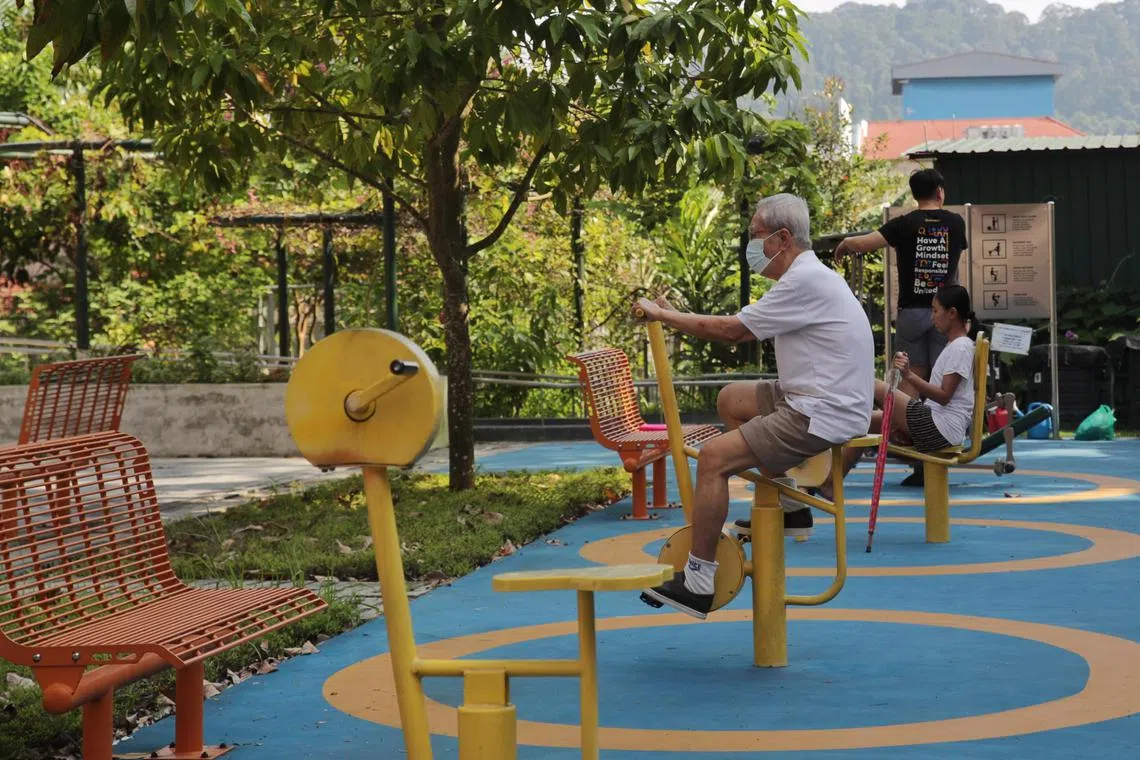Initiatives in place to tackle ageing issues as S’pore hits ‘super-aged’ status in 2026: Health Minister
Sign up now: Get ST's newsletters delivered to your inbox

By 2030, one in four citizens in Singapore will be aged 65 and above, up from one in six now.
ST PHOTO: GIN TAY
Follow topic:
SINGAPORE – From helping seniors age in the community and remain healthy to ensuring they have enough for retirement, Singapore has been preparing for a “super-aged” society and will continue to do so, Health Minister Ong Ye Kung said in Parliament on Thursday.
During the debate on the President’s Address on Thursday, he said ageing is the biggest social transformation in Singapore for this generation.
Building on the foundation established over many years, the country is embarking on a major preventive care strategy – Healthier SG, where individuals are encouraged to work with a general practitioner to take charge of their health. It is slated to launch in July.
But primary care doctors cannot work alone. They may need to escalate more serious cases to secondary and tertiary care in hospitals, Mr Ong said.
For the majority of less serious cases, or for healthy residents, they need to devolve care to communities and families.
Mr Ong said the communities people live in and the families dear to them create and sustain health. “Studies show that 60 per cent of health is determined by social factors, within communities and families,” he said.
“It is about having a good family environment, hygienic living conditions, nutritious food, education for children, good employment opportunities, and public amenities like parks, libraries and sports facilities.”
Where health interventions are needed, they are often more social than medical, Mr Ong said. Common-sense efforts like eating well and going for periodic screening, however, tend to fall prey to inertia, though this can be overcome with community support.
“This is the next area where big changes need to take place,” said Mr Ong. “Beyond Healthier SG, the next... priority for MOH (Ministry of Health) is to build up community care, to get us all to do what is right for our health, and to support ageing in communities.”
Mr Ong said this will be a continuation of Healthier SG, and a national programme as ambitious and extensive as Healthier SG.
Singapore became an aged society in 2017, and is set to attain “super-aged” status in 2026. By 2030, one in four citizens will be aged 65 and above, up from one in six now.
The United Nations defines a country as “ageing” if the proportion of its population aged 65 and above crosses 7 per cent. It is “aged” if the proportion exceeds 14 per cent, and “super aged” when it reaches 21 per cent.
Planning for these developments has been years in the making. Mr Ong said Singapore started with thinking about changes to the retirement age and the Central Provident Fund (CPF) system some 40 years ago.
The Government set up the Committee on Ageing Issues almost 20 years ago, and formalised it into the Ministerial Committee on Ageing in 2007.
In February 2023, Mr Ong, who helms the ministerial committee, said he launched an update of Singapore’s Action Plan on Successful Ageing
Creating aged-friendly living environments enables seniors to age in place. The Housing Board is redeveloping old areas and launching new projects in old towns to ensure inter-generational mixing, for instance.
Queenstown, one of Singapore’s oldest towns, where more than 20 per cent of residents are 65 and above, has been carved out as a health district and is being transformed with initiatives such as healthcare services to support seniors. It gives the Government a glimpse of what things could be like by 2030, when most towns here will be like Queenstown, Mr Ong said.
Singapore must also adapt its economy to an ageing population, and has been gradually raising the retirement and re-employment ages. These will be raised to 65 and 70, respectively, by 2030. Unlike in France and other developed Western countries, this does not affect the retirement savings people have built up in their CPF accounts, Mr Ong said.
The main impact of raising these ages is that older workers are protected from being dismissed by employers because of their age, he said.
At the same time, Singaporeans’ retirement adequacy will continue to be improved.
“Preparing for ageing, be it in the areas of urban planning, economic development, retirement adequacy or healthcare reforms, requires anticipatory policymaking, which is a hallmark of the Singapore Government,” said Mr Ong.
“We have made preparations for an aged society in these areas well ahead of time,” he said, adding that Singapore had a head start of more than a decade “before the problem caught up with us”.
As life expectancy rises in tandem with the disease burden, many health systems become inadequate as they were designed when life expectancy was much lower.
Mr Ong likened the situation to “an overflowing kitchen sink”, and said the tap must be turned off at some point to solve the problem. In healthcare, this means slowing the onset of severe diseases and making people healthier.
This is to prevent the sheer disease burden driven by ageing from overloading the healthcare system, or even to the point of crippling the Government’s finances, he said.
“While Singapore will inexorably become a super-aged country, it can remain a superb country,” Mr Ong said.


